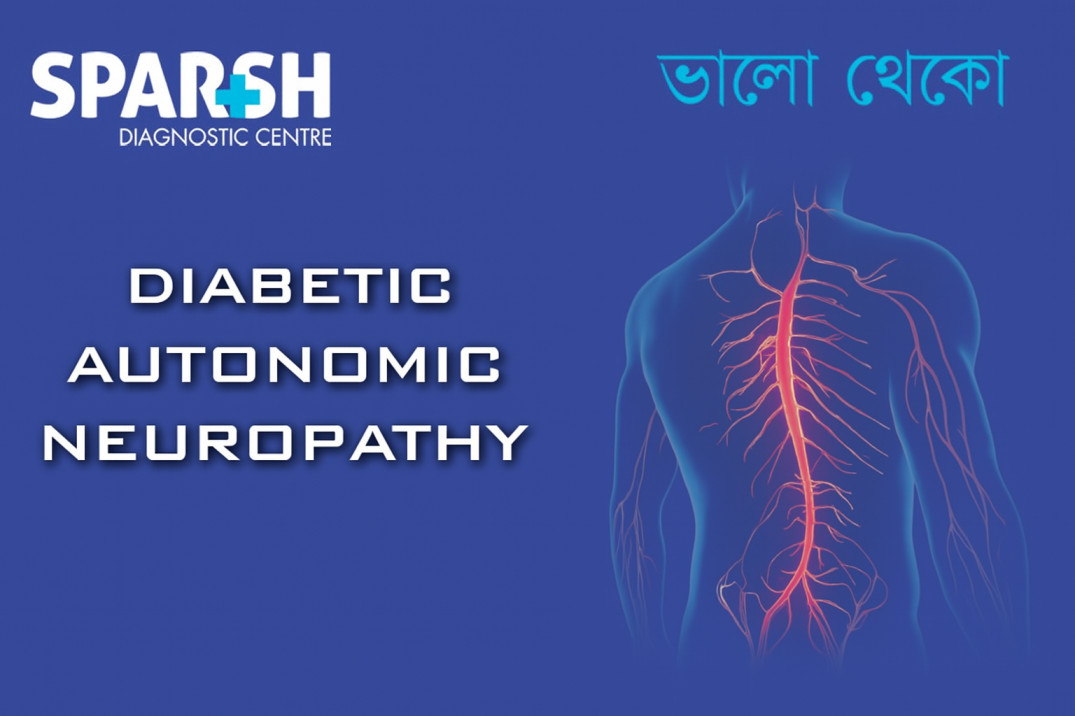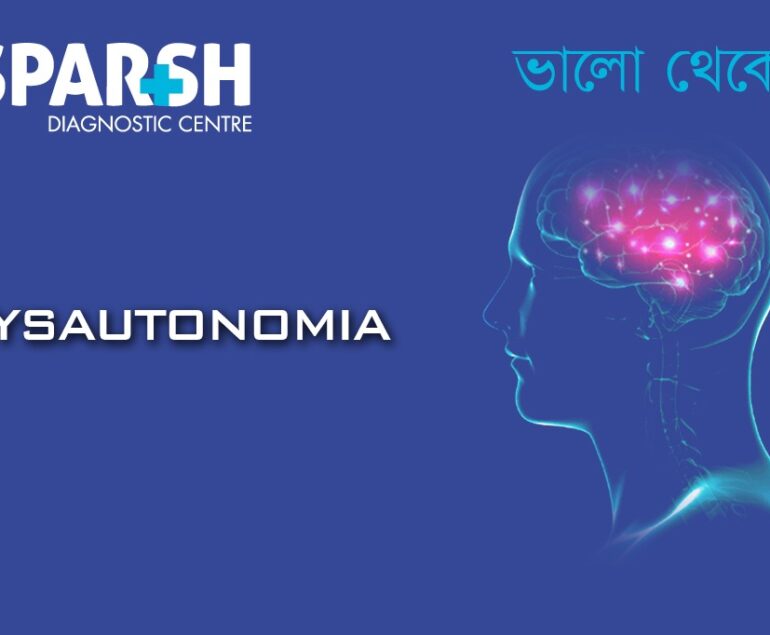Living with diabetes involves more than managing blood sugar levels — it means keeping a close eye on possible complications that may affect various organs and systems. One such serious and often underrecognized complication is Diabetic Autonomic Neuropathy (DAN).
This condition affects the autonomic nervous system (ANS) — the part of the nervous system that controls involuntary body functions such as heart rate, blood pressure, digestion, bladder function, and sweating. When diabetes damages these nerves, it can disrupt many essential body processes, leading to potentially severe consequences.
This article explores everything you need to know about Diabetic Autonomic Neuropathy, including its causes, symptoms, diagnosis, and available treatments.
What Is Diabetic Autonomic Neuropathy?
Diabetic Autonomic Neuropathy (DAN) is a form of nerve damage caused by long-term, poorly controlled diabetes mellitus. It primarily affects the autonomic nervous system, which regulates unconscious body functions such as heartbeat, digestion, and breathing.
Because the ANS controls multiple organs, DAN can lead to diverse symptoms — from abnormal heart rhythms and digestive problems to bladder issues and sexual dysfunction.
It often develops gradually and may go unnoticed until significant nerve damage has occurred.
Causes of Diabetic Autonomic Neuropathy
The main cause of Diabetic Autonomic Neuropathy is chronic high blood glucose (hyperglycemia), which damages nerves and the small blood vessels that supply them.
Several factors can increase the risk of developing DAN:
Poorly Controlled Diabetes: Long-term high blood sugar levels are the primary cause.
Duration of Diabetes: The longer you’ve had diabetes, the higher your risk.
High Blood Pressure (Hypertension): This can worsen nerve damage.
High Cholesterol Levels: Excess fats in the blood can damage blood vessels supplying the nerves.
Smoking and Alcohol Use: Both can accelerate nerve damage.
Obesity and Sedentary Lifestyle: These increase the risk of both diabetes and neuropathy.
Types of Autonomic Neuropathy in Diabetes
DAN can affect various systems in the body, leading to different types depending on which organs are involved:
Cardiovascular Autonomic Neuropathy (CAN): Affects heart rate, blood pressure, and circulation.
Gastrointestinal Neuropathy: Impairs digestion and bowel movement.
Genitourinary Neuropathy: Affects bladder control and sexual function.
Sudomotor Neuropathy: Alters sweating patterns.
Pupillary Neuropathy: Impairs pupil response to light and darkness.
Symptoms of Diabetic Autonomic Neuropathy
Symptoms vary depending on which nerves are affected. They can range from mild discomfort to life-threatening complications.
1. Cardiovascular Symptoms
Resting tachycardia (rapid heartbeat even at rest)
Dizziness or fainting when standing (orthostatic hypotension)
Reduced exercise tolerance
2. Gastrointestinal Symptoms
Nausea, vomiting, and bloating
3. Genitourinary Symptoms
Incomplete bladder emptying
Frequent urinary tract infections (UTIs)
Erectile dysfunction in men
Vaginal dryness or reduced libido in women
4. Sudomotor Symptoms
Reduced sweating, especially on hands or feet
Excessive sweating at night or while eating
5. Pupillary Symptoms
Difficulty adjusting to light or darkness
Blurred vision, especially at night
Because DAN affects multiple organs, symptoms can appear unrelated, which often delays diagnosis.
Complications of Diabetic Autonomic Neuropathy
If left untreated, DAN can lead to severe health consequences, including:
Sudden cardiac death due to abnormal heart rhythms
Severe gastrointestinal problems such as chronic nausea or malnutrition
Loss of bladder control and recurrent urinary infections
Sexual dysfunction, impacting quality of life
Heat intolerance due to sweating abnormalities
Early recognition and management are vital to prevent these outcomes.
Diagnosis of Diabetic Autonomic Neuropathy
Diagnosing DAN requires a combination of clinical evaluation, symptom history, and specialized tests.
1. Medical History and Physical Examination
The doctor will assess:
Diabetes control history
Symptoms such as dizziness, digestive issues, or bladder problems
Blood pressure changes when standing or sitting
2. Cardiovascular Tests
Heart rate variability test: Measures how your heart rate changes with breathing.
Tilt-table test: Evaluates blood pressure and heart rate response when changing positions.
24-hour heart monitoring (Holter test): Detects irregular heart rhythms.
3. Gastrointestinal Tests
Gastric emptying study: Determines how fast food leaves your stomach.
Electrogastrography: Measures electrical activity in the stomach.
4. Urological Tests
Bladder ultrasound or urodynamic testing: Checks for incomplete bladder emptying.
5. Sudomotor Function Tests
Quantitative Sudomotor Axon Reflex Test (QSART): Measures sweat production.
Thermoregulatory Sweat Test: Assesses body’s sweating pattern.
Treatment and Management of Diabetic Autonomic Neuropathy
While DAN cannot be fully cured, early diagnosis and management can slow progression and alleviate symptoms.
1. Blood Sugar Control
The foundation of treatment is tight blood glucose management through:
Regular monitoring
Adjusted insulin or oral medication regimen
Healthy diet and regular exercise
Maintaining optimal glucose levels can prevent further nerve damage.
2. Medications for Specific Symptoms
Cardiovascular Symptoms
Fludrocortisone or midodrine may help manage low blood pressure.
Beta-blockers for controlling heart rate (under medical supervision).
Gastrointestinal Symptoms
Metoclopramide or domperidone can improve stomach emptying.
Dietary changes — small, frequent meals low in fat and fiber.
Laxatives or fiber supplements for constipation.
Bladder Symptoms
Scheduled urination and catheterization for incomplete emptying.
Antibiotics for recurrent infections.
Sexual Dysfunction
Phosphodiesterase inhibitors (e.g., sildenafil) for erectile dysfunction.
Lubricants or estrogen therapy for women with vaginal dryness.
Sweating Abnormalities
Antiperspirants for excessive sweating.
Staying hydrated and avoiding heat exposure for reduced sweating.
3. Lifestyle Modifications
Quit smoking and alcohol: Both accelerate nerve damage.
Exercise regularly: Improves circulation and nerve function.
Maintain a balanced diet: Rich in antioxidants, vitamins B12 and D.
Monitor blood pressure and cholesterol levels.
4. Psychological Support
Chronic symptoms can affect quality of life. Counseling or joining a diabetes support group can help manage anxiety, depression, and lifestyle adjustments.
Prevention of Diabetic Autonomic Neuropathy
Preventing DAN primarily involves managing diabetes effectively and making healthy lifestyle choices.
Key Preventive Measures:
Keep HbA1c levels within target range.
Maintain healthy blood pressure and cholesterol levels.
Get regular diabetic nerve function screenings.
Follow a balanced diet rich in fiber, lean proteins, and low-glycemic foods.
Avoid smoking and excessive alcohol.
Engage in daily physical activity such as walking, yoga, or swimming.
Living with Diabetic Autonomic Neuropathy
Managing DAN is a lifelong commitment requiring collaboration between patient and healthcare provider.
Regular medical follow-ups, a tailored treatment plan, and healthy living can significantly reduce the impact of symptoms and improve daily functioning.
Patients should monitor and report any new symptoms — such as dizziness, bowel changes, or urinary problems — to their doctor promptly.
When to See a Doctor
You should seek medical attention if you experience:
Lightheadedness or fainting on standing
Rapid or irregular heartbeat
Persistent digestive issues
Difficulty emptying your bladder
Unexplained sweating changes
Sexual dysfunction
Early intervention can help prevent severe complications.
FAQs on Diabetic Autonomic Neuropathy
1. Can Diabetic Autonomic Neuropathy be reversed?
Unfortunately, nerve damage from DAN cannot be completely reversed. However, maintaining good blood sugar control and addressing symptoms early can slow progression and improve quality of life.
2. Is Diabetic Autonomic Neuropathy life-threatening?
In some cases, yes. DAN affecting the cardiovascular system can lead to serious complications such as silent heart attacks or sudden cardiac death. Regular checkups are essential for early detection.
3. How is Diabetic Autonomic Neuropathy different from peripheral neuropathy?
Peripheral neuropathy affects nerves controlling sensation (like pain and temperature), while autonomic neuropathy affects involuntary body functions such as heart rate, digestion, and bladder control.
4. What lifestyle changes help manage DAN?
Keeping blood sugar under control
Eating smaller, more frequent meals
Exercising regularly
Avoiding alcohol and smoking
Staying hydrated and maintaining a healthy weight
5. What tests are done to detect autonomic neuropathy?
Tests like heart rate variability, tilt-table test, gastric emptying study, and sweat tests help assess autonomic nerve function.
6. Does everyone with diabetes develop autonomic neuropathy?
No. The risk increases with the duration of diabetes, poor glycemic control, and unhealthy habits, but it can be prevented or delayed with proper diabetes management.
7. Can DAN affect sleep or mood?
Yes. Digestive issues, urinary symptoms, or heart irregularities can disturb sleep, while chronic discomfort may lead to anxiety or depression.
Diabetic Autonomic Neuropathy is one of the most complex complications of diabetes, affecting multiple organ systems and leading to diverse symptoms. While it cannot be fully reversed, early detection, strict blood sugar control, and symptom-based treatment can significantly improve a patient’s quality of life.
If you notice persistent digestive issues, dizziness, bladder problems, or sexual dysfunction and have diabetes, consult a healthcare provider promptly.
Early management can prevent serious complications and help you live a healthier, more balanced life.
#BhaloTheko
Disclaimer:
No content on this site, regardless of date, should ever be used as a substitute for direct medical advice from your doctor or other qualified clinician.

![]()





